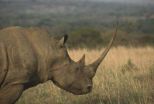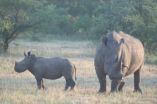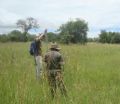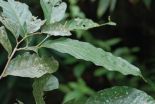(Press-News.org) White rhinoceros may be extinct in twenty years with the current poaching rates. The loss of this megaherbivore is in itself a tragedy, but it may also have tremendous effects on the ecosystems they now live in.
The white rhino (Ceratotherium simum), and other megaherbivores, are key drivers of ecosystem functioning because they´re not controlled by predation.
A new study by Joris Cromsigt and Mariska te Beest, published in Journal of Ecology, highlights the role of the white rhino in the savannah ecosystems.
Earlier empirical studies on the ecosystem impact of megaherbivores are strongly biased to African elephant with very little contemporary evidence for other megaherbivore species. Cromsigt and te Beest quantifies how rhino recolonized Kruger National Park (KNP) following their re-introduction in the 1960s to create a unique 'recolonization experiment' and tests how this megagrazer is affecting the structure of savanna grasslands.
The researchers identified landscapes that rhino recolonized long time ago versus landscapes that were recolonized more recently. The assumption was that time since colonization represents a proxy for extent of rhino impact. Grassland heterogeneity on 40 transects covering a total of 30 kilometer were recorded. Short grass cover was clearly higher in the high rhino impact than low rhino impact landscape. Moreover, they encountered about 20 times more grazing lawns, a specific grassland community, in the high rhino impact landscape. The conclusion is that white rhinoceros may have started to change the structure and composition of KNP's savanna grasslands. The amount of short grass in savannas has important consequences for other species, but also components of ecosystem functioning such as fire regimes. The results highlight that this poaching crisis not only affects the species but threatens the potentially key role of this megaherbivore as a driver of savannah functioning.
INFORMATION:
Restoration of a megaherbivore: landscape-level impacts of white rhinoceros in Kruger National Park, South Africa
The article is published online in Journal of Ecology 12 feb 2014,
DOI: 10.1111/1365-2745.12218
http://onlinelibrary.wiley.com/doi/10.1111/1365-2745.12218/abstract
Poaching threatens savannah ecosystems
White rhinoceros may be extinct in 20 years with the current poaching rates; The loss of this megaherbivore is in itself a tragedy, but it may also have tremendous effects on the ecosystems they now live in
2014-02-12
ELSE PRESS RELEASES FROM THIS DATE:
Exercise targets cellular powerhouses to improve heart function
2014-02-12
Whether lifting weights in a gym or just walking around the block, exercise has many benefits, such as helping people lose weight and build stronger muscles. Some studies suggest that it may reduce the risk of developing cancer and other diseases. Researchers now report in ACS' Journal of Proteome Research that moderate, long-term physical activity appears to improve cardiovascular health in mice by targeting the heart cells' powerhouses — the mitochondria.
Eduard Sabidó, Francisco Amado and colleagues explain that despite the well-documented benefits of exercise, the ...
How stellar death can lead to twin celestial jets
2014-02-12
Astronomers know that while large stars can end their lives as violently cataclysmic supernovae, smaller stars end up as planetary nebulae – colorful, glowing clouds of dust and gas. In recent decades these nebulae, once thought to be mostly spherical, have been observed to often emit powerful, bipolar jets of gas and dust. But how do spherical stars evolve to produce highly aspherical planetary nebulae?
In a theoretical paper published this week in the Monthly Notices of the Royal Astronomical Society, a University of Rochester professor and his undergraduate student ...
GVSU researchers draw link between zebra mussels, risk of algae blooms
2014-02-12
Researchers at Grand Valley State University's Annis Water Resources Institute are learning more about the impact invasive zebra mussels and native aquatic insect larvae have on the risk of algae blooms in two West Michigan lakes. The results of the research will be published in the journal Oikos.
Postdoctoral researcher Geraldine Nogaro and AWRI director Alan Steinman studied the impact that invasive zebra mussels and native chironomid larvae have on nutrient releases in Muskegon Lake and Bear Lake. While studying the mussels, Nogaro and Steinman noted that filter feeding ...
Waste from age-old paper industry becomes new source of solid fuel
2014-02-12
In today's search for renewable energy sources, researchers are turning to the hi-tech, from solar and hydrogen fuel cells, and the very low-tech. The latest example of a low-tech alternative comes from an age-old industry: paper. A new study, appearing in ACS' journal Energy & Fuels, reveals a sustainable way to turn the huge amounts of waste from paper production into solid fuel with the added bonus of diverting the sludge from overflowing landfills.
Chinnathan Areeprasert, Peitao Zhao and colleagues note that making paper, from debarking and chipping wood to the final ...
Australian state has higher rate of hypothermia deaths than Sweden
2014-02-12
New research from the University of Adelaide shows that the state of South Australia has a higher rate of deaths from extreme cold compared with the northern European nation of Sweden.
The study, by a team from the University's School of Medical Sciences, analyzed forensic cases of hypothermia deaths from 2006-2011 in both South Australia and Sweden.
The results show that South Australia had a rate of 3.9 deaths for every 100,000 people, compared with Sweden's 3.3 deaths per 100,000. In total, there were 62 fatal cases of hypothermia in South Australia and 296 cases ...
A new species of Oak hidden away in the greenery of Ton Pariwat Wildlife Sanctuary
2014-02-12
An international team of scientists from Xishuangbanna Tropical Botanical Garden (China) and the Forest Herbarium (BKF - Thailand) discovered a new species of Stone Oak in the Ton Pariwat Wildlife Sanctuary in Thailand. This isolated sanctuary is popular for its rich bird- and wildlife such as the Blue-banded Kingfisher and Whitehanded Gibbons, as well for its rare and beautiful flora like Rafflesia's - known to hold some of the largest flowers on earth. The wildlife sanctuary covers a region of low-lying forested mountains and is located in the middle of a fascinating ...
Novel compound keeps Parkinson's symptoms at bay in mice
2014-02-12
Scientists report that they have developed a novel compound that appears to protect mice against developing movement problems associated with Parkinson's disease (PD). The research, which could one day in the future translate into a therapy that could halt the progression of PD and thereby prevent the symptoms of the disease, appears in ACS' Journal of Medicinal Chemistry.
Onyou Hwang, Ki Duk Park and colleagues explain that PD, which affects an estimated 4 million to 10 million people worldwide, is a progressive movement disorder with no known cure. It often starts ...
Paper examines clinical and policy implications of intimate partner violence
2014-02-12
(Boston) --Intimate partner violence (IPV) is a serious public health concern for all, however women who experience IPV are more likely to sustain injury and report adverse health consequences. An expanding body of research suggests that experience of IPV is common in women veterans (WV), particularly those who access Veterans Health Administration (VA) services.
In a review paper currently available online in the Journal of Women's Health, Megan R. Gerber, MD, MPH, assistant professor of medicine, Boston University School of Medicine and Medical Director, Women's Health, ...
New system combines control programs so fleets of robots can collaborate
2014-02-12
Writing a program to control a single autonomous robot navigating an uncertain environment with an erratic communication link is hard enough; write one for multiple robots that may or may not have to work in tandem, depending on the task, is even harder.
As a consequence, engineers designing control programs for "multiagent systems" — whether teams of robots or networks of devices with different functions — have generally restricted themselves to special cases, where reliable information about the environment can be assumed or a relatively simple collaborative task can ...
Bees fight to a stalemate in the battle of the sexes according to new research
2014-02-12
Just like humans, whether or not some genes are switched on in bumblebees is a result of a battle of the sexes between genes inherited from their mother and genes inherited from their father.
Published online today (Wednesday 12 February) in the Royal Society journal, Proceedings of the Royal Society B, a new study from the University of Leicester provides new evidence for the kinship theory of evolution of genomic imprinting in bumblebees.
Each bumblebee worker inherits two copies of every gene – one from their mother and one from their father. For a small number ...
LAST 30 PRESS RELEASES:
Scientists discover why we know when to stop scratching an itch
A hidden reason inner ear cells die – and what it means for preventing hearing loss
Researchers discover how tuberculosis bacteria use a “stealth” mechanism to evade the immune system
New microscopy technique lets scientists see cells in unprecedented detail and color
Sometimes less is more: Scientists rethink how to pack medicine into tiny delivery capsules
Scientists build low-cost microscope to study living cells in zero gravity
The Biophysical Journal names Denis V. Titov the 2025 Paper of the Year-Early Career Investigator awardee
Scientists show how your body senses cold—and why menthol feels cool
Scientists deliver new molecule for getting DNA into cells
Study reveals insights about brain regions linked to OCD, informing potential treatments
Does ocean saltiness influence El Niño?
2026 Young Investigators: ONR celebrates new talent tackling warfighter challenges
Genetics help explain who gets the ‘telltale tingle’ from music, art and literature
Many Americans misunderstand medical aid in dying laws
Researchers publish landmark infectious disease study in ‘Science’
New NSF award supports innovative role-playing game approach to strengthening research security in academia
Kumar named to ACMA Emerging Leaders Program for 2026
AI language models could transform aquatic environmental risk assessment
New isotope tools reveal hidden pathways reshaping the global nitrogen cycle
Study reveals how antibiotic structure controls removal from water using biochar
Why chronic pain lasts longer in women: Immune cells offer clues
Toxic exposure creates epigenetic disease risk over 20 generations
More time spent on social media linked to steroid use intentions among boys and men
New study suggests a “kick it while it’s down” approach to cancer treatment could improve cure rates
Milken Institute, Ann Theodore Foundation launch new grant to support clinical trial for potential sarcoidosis treatment
New strategies boost effectiveness of CAR-NK therapy against cancer
Study: Adolescent cannabis use linked to doubling risk of psychotic and bipolar disorders
Invisible harms: drug-related deaths spike after hurricanes and tropical storms
Adolescent cannabis use and risk of psychotic, bipolar, depressive, and anxiety disorders
Anxiety, depression, and care barriers in adults with intellectual and developmental disabilities
[Press-News.org] Poaching threatens savannah ecosystemsWhite rhinoceros may be extinct in 20 years with the current poaching rates; The loss of this megaherbivore is in itself a tragedy, but it may also have tremendous effects on the ecosystems they now live in




